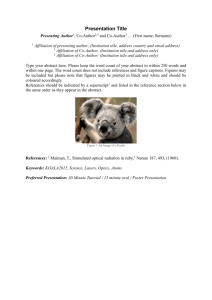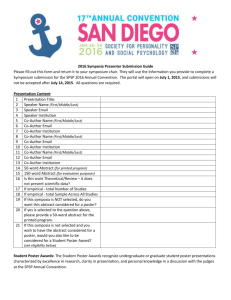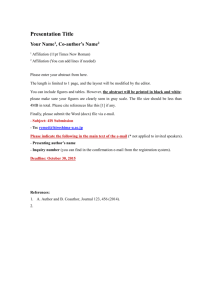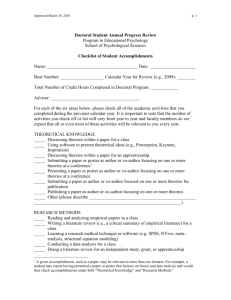Peg Griffin - The Laboratory of Comparative Human Cognition
advertisement
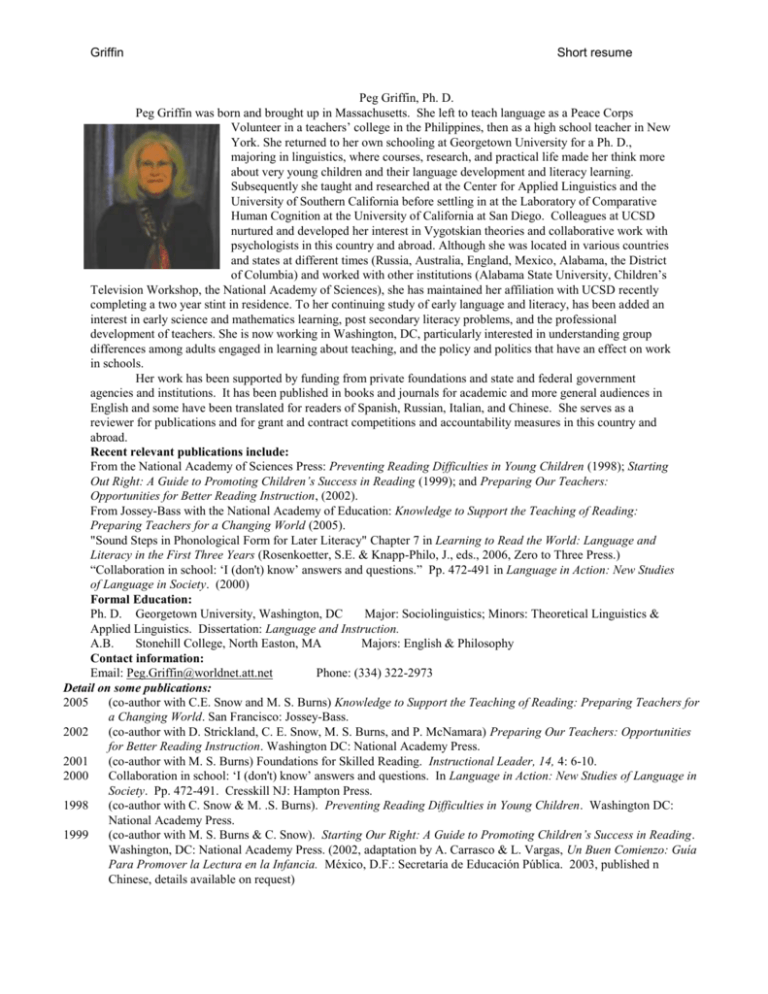
Griffin Short resume Peg Griffin, Ph. D. Peg Griffin was born and brought up in Massachusetts. She left to teach language as a Peace Corps Volunteer in a teachers’ college in the Philippines, then as a high school teacher in New York. She returned to her own schooling at Georgetown University for a Ph. D., majoring in linguistics, where courses, research, and practical life made her think more about very young children and their language development and literacy learning. Subsequently she taught and researched at the Center for Applied Linguistics and the University of Southern California before settling in at the Laboratory of Comparative Human Cognition at the University of California at San Diego. Colleagues at UCSD nurtured and developed her interest in Vygotskian theories and collaborative work with psychologists in this country and abroad. Although she was located in various countries and states at different times (Russia, Australia, England, Mexico, Alabama, the District of Columbia) and worked with other institutions (Alabama State University, Children’s Television Workshop, the National Academy of Sciences), she has maintained her affiliation with UCSD recently completing a two year stint in residence. To her continuing study of early language and literacy, has been added an interest in early science and mathematics learning, post secondary literacy problems, and the professional development of teachers. She is now working in Washington, DC, particularly interested in understanding group differences among adults engaged in learning about teaching, and the policy and politics that have an effect on work in schools. Her work has been supported by funding from private foundations and state and federal government agencies and institutions. It has been published in books and journals for academic and more general audiences in English and some have been translated for readers of Spanish, Russian, Italian, and Chinese. She serves as a reviewer for publications and for grant and contract competitions and accountability measures in this country and abroad. Recent relevant publications include: From the National Academy of Sciences Press: Preventing Reading Difficulties in Young Children (1998); Starting Out Right: A Guide to Promoting Children’s Success in Reading (1999); and Preparing Our Teachers: Opportunities for Better Reading Instruction, (2002). From Jossey-Bass with the National Academy of Education: Knowledge to Support the Teaching of Reading: Preparing Teachers for a Changing World (2005). "Sound Steps in Phonological Form for Later Literacy" Chapter 7 in Learning to Read the World: Language and Literacy in the First Three Years (Rosenkoetter, S.E. & Knapp-Philo, J., eds., 2006, Zero to Three Press.) “Collaboration in school: ‘I (don't) know’ answers and questions.” Pp. 472-491 in Language in Action: New Studies of Language in Society. (2000) Formal Education: Ph. D. Georgetown University, Washington, DC Major: Sociolinguistics; Minors: Theoretical Linguistics & Applied Linguistics. Dissertation: Language and Instruction. A.B. Stonehill College, North Easton, MA Majors: English & Philosophy Contact information: Email: Peg.Griffin@worldnet.att.net Phone: (334) 322-2973 Detail on some publications: 2005 (co-author with C.E. Snow and M. S. Burns) Knowledge to Support the Teaching of Reading: Preparing Teachers for a Changing World. San Francisco: Jossey-Bass. 2002 (co-author with D. Strickland, C. E. Snow, M. S. Burns, and P. McNamara) Preparing Our Teachers: Opportunities for Better Reading Instruction. Washington DC: National Academy Press. 2001 (co-author with M. S. Burns) Foundations for Skilled Reading. Instructional Leader, 14, 4: 6-10. 2000 Collaboration in school: ‘I (don't) know’ answers and questions. In Language in Action: New Studies of Language in Society. Pp. 472-491. Cresskill NJ: Hampton Press. 1998 (co-author with C. Snow & M. .S. Burns). Preventing Reading Difficulties in Young Children. Washington DC: National Academy Press. 1999 (co-author with M. S. Burns & C. Snow). Starting Our Right: A Guide to Promoting Children’s Success in Reading. Washington, DC: National Academy Press. (2002, adaptation by A. Carrasco & L. Vargas, Un Buen Comienzo: Guía Para Promover la Lectura en la Infancia. México, D.F.: Secretaría de Educación Pública. 2003, published n Chinese, details available on request) Griffin 1993 1992 1989 1989 1988 1987 1987 1986 1986 1984 1984 1982. 1982 1982 1982 1982 1980 1980 1981 1981 1979 1979 1978 1978 1978 1977 Short resume (co-authors A. V. Belyaeva & G. Soldatova). Creating and reconstituting contexts for educational interactions including a computer program. In E. Foreman, N. Minnick, & A. Stone, eds., Contexts for Learning: Sociocultural Dynamics in Children's Development. Oxford: Oxford University Press. Pp. 120-152. (co-author with A. V. Belyaeva & G. Soldatova). Socio-historical concepts applied to observations of computer use. European Journal of Psychology of Education, 7(4), 269-286. (co-author with D. Newman & M. Cole). The Construction Zone: Working for Cognitive Change in School. Cambridge: Cambridge University Press. (1991, in Spanish, Pablo Manzano, trans. , Madrid: Ediciones Morata, S.A.) (co-author with M. Cole, E. Diaz, & C. King). Socialno-istoricheskii Podhod V Psychologii Obuchenia (Sociohistorical view on the psychology of learning). Boris Velichovsky., trans. Moscow: Pedagogika. (as part of LCHC). Computer networking for child development. SRCD Newsletter, Winter 1988, 1-4. (co-author with M. Cole). New technologies, basic skills and the underside of education: What's to be done? In J. Langer, ed., Language, Literacy and Culture: Issues of Society and Schooling. Norwood, NJ: Ablex. Pp. 199-231. (co-author with M. Cole & Laboratory of Comparative Human Cognition). Contextual Factors in Education: Improving Science and Mathematics Education for Minorities and Women. Report to the National Research Council. Madison, WI: Wisconsin Center for Education Research. (co-author with M. Cole). A sociohistorical approach to remediation. In S. de Castell, A. Luke, & K. Egan, eds., Literacy, Society and Schooling: A Reader. Cambridge: Cambridge University Press. Pp. 110-132. (as part of LCHC). The contribution of cross-cultural research in educational practice. American Psychologist 41(10) 1049-1058. (co-author with M. Cole). Current activity for the future: The Zo-ped. In B. Rogoff and J.V. Wertsch, eds., New Directions for Child Development, No. 23. San Francisco: Jossey-Bass. Pp. 45-64. (co-author with D. Newman & M. Cole). Social constraints in laboratory and classroom tasks In B. Rogoff & J. Lave, eds., Everyday Cognition: Its Development in Social Contexts. Cambridge MA: Harvard University Press. Pp. 172193. (co-author with M. Cole, & D. Newman). Locating tasks in psychology and education. Discourse Processes, 5(2), 111-125. Readability formulae and their inappropriate assumptions about reading. In A. Davison, A. Kantor, & R. Lutz, eds., Proceedings from the Illinois Readability Conference. Champaign-Urbana: Center for the Study of Reading. (as part of LCHC). A model system for the study of learning difficulties. The Newsletter of the Laboratory of Comparative Human Cognition 4 (3). (as part of LCHC). Culture and cognitive development. In W. Kessen, ed., Mussen Handbook of Child Development (Vol. I). New York: Wiley. (as part of LCHC). Culture and intelligence. In R. Sternberg, ed., Handbook of Human intelligence. Cambridge: Cambridge University Press. (co-author H. Mehan). Socialization: The view from classroom interactions. Sociological Inquiry 50(3-4) 357-392. (co-author with M. Cole). Cultural amplifiers reconsidered. In D. Olson, ed., Social Foundations of Language and Thought. New York: Morton Press. 343-364. (co-author with R. Shuy). What do they do at school any day: Studying functional language. In W. Patrick Dickson, ed., Children's Oral Communication Skills. New York: Academic Press. Pp. 271-286. (co-author with H. Mehan). Sense and ritual in classroom discourse. In Florian Coulmas, ed., Conversational Routine: Explorations in Standardized Communication Situations and Prepatterned Speech. The Hague: Mouton. Pp. 187-213. Three social factors involved in language and bilingual education programs. In G. Briere, ed., Language Development in a Bilingual Setting. Los Angeles: HDAC. Pp. 60-72. (as part of LCHC). Cross-cultural psychology's challenges to our ideas of children and development. American Psychologist, 34 (10) 827-833. (co-edited with R. Shuy). Children's Functional Language and Education in the Early Years. Report to the Carnegie Corporation of New York. Arlington, VA: Center for Applied Linguistics. (co-author with F. Humphrey). Talk and task at lesson time. In Children's Functional Language and Education in the Early Years. Chapter 9. (ed., Griffin, co-author with T. Dieterich & C. Freeman) Assessing Comprehension in a School Setting. Papers in Applied Linguistics, Linguistics and Reading Series 3, ed. R. W. Shuy. Washington: Center for Applied Linguistics. How and when does reading occur in the classroom. Theory into Practice, 16(5) 376-383. Griffin 1977 Short resume Reading and Pragmatics: Symbiosis. In R. Shuy, ed., Linguistic Theory: What Can It Say about Reading? Newark, Del.: IRA. Pp. 123-142.
